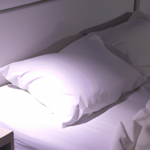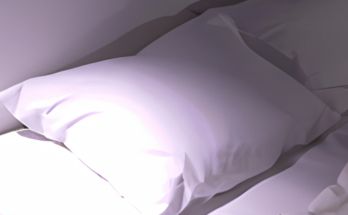The Benefits of Establishing a Sleep Routine
Establishing a sleep routine is an important part of maintaining a healthy lifestyle. A consistent sleep routine can help to improve overall physical and mental health, as well as improve productivity and concentration.
One of the primary benefits of establishing a sleep routine is improved physical health. When the body is able to get the recommended amount of sleep each night, it is better able to fight off illnesses and maintain a healthy immune system. Additionally, getting enough sleep can help to reduce the risk of developing chronic health conditions such as diabetes, heart disease, and obesity.
Establishing a sleep routine can also help to improve mental health. When the body is well-rested, it is better able to cope with stress and anxiety. Additionally, getting enough sleep can help to improve mood and reduce the risk of depression.
Finally, establishing a sleep routine can help to improve productivity and concentration. When the body is well-rested, it is better able to focus and concentrate on tasks. Additionally, getting enough sleep can help to improve memory and cognitive function.
In conclusion, establishing a sleep routine is an important part of maintaining a healthy lifestyle. A consistent sleep routine can help to improve physical and mental health, as well as improve productivity and concentration.
How to Create a Sleep-Friendly Environment
Creating a sleep-friendly environment is essential for getting a good night’s rest. A comfortable and calming atmosphere can help you relax and drift off to sleep more easily. Here are some tips for creating a sleep-friendly environment in your bedroom.
1. Keep the temperature cool. The ideal temperature for sleeping is between 60 and 67 degrees Fahrenheit. Keeping your bedroom cool can help you fall asleep faster and stay asleep longer.
2. Reduce noise. Unwanted noise can disrupt your sleep. Consider using a white noise machine or earplugs to block out any disruptive sounds.
3. Dim the lights. Exposure to bright light can interfere with your body’s natural sleep-wake cycle. Make sure to dim the lights in your bedroom before bedtime.
4. Use comfortable bedding. Invest in comfortable bedding that is made of breathable materials. This will help you stay cool and comfortable throughout the night.
5. Avoid screens. The blue light emitted from screens can interfere with your body’s natural sleep-wake cycle. Avoid using screens at least an hour before bedtime.
By following these tips, you can create a sleep-friendly environment that will help you get a good night’s rest.
The Impact of Diet and Exercise on Sleep Quality
Good sleep is essential for physical and mental health. Diet and exercise are two important factors that can affect sleep quality. This article will discuss the impact of diet and exercise on sleep quality.
Diet plays an important role in sleep quality. Eating a balanced diet with plenty of fruits, vegetables, and whole grains can help promote better sleep. Eating too much or too little can disrupt sleep. Eating a large meal close to bedtime can cause indigestion and make it difficult to fall asleep. Eating foods that are high in sugar or caffeine can also interfere with sleep.
Exercise is also important for good sleep. Regular exercise can help improve sleep quality and duration. Exercise can help reduce stress and anxiety, which can interfere with sleep. Exercise can also help regulate hormones that affect sleep. However, exercising too close to bedtime can make it difficult to fall asleep.
In conclusion, diet and exercise can both have a significant impact on sleep quality. Eating a balanced diet and exercising regularly can help promote better sleep. Eating too much or too little, or eating foods that are high in sugar or caffeine can disrupt sleep. Exercising too close to bedtime can also interfere with sleep. By following a healthy diet and exercising regularly, you can help ensure that you get a good night’s sleep.
The Benefits of Limiting Caffeine and Alcohol Intake
Caffeine and alcohol are two of the most widely consumed substances in the world. While both can provide short-term benefits, such as increased alertness and relaxation, long-term use of either can lead to serious health problems. Limiting caffeine and alcohol intake can have a number of positive effects on physical and mental health.
One of the primary benefits of limiting caffeine and alcohol intake is improved cardiovascular health. Caffeine is a stimulant that can increase heart rate and blood pressure, while alcohol can cause irregular heartbeats and weaken the heart muscle. Limiting intake of both can reduce the risk of heart disease, stroke, and other cardiovascular problems.
Limiting caffeine and alcohol intake can also improve mental health. Caffeine can cause anxiety and insomnia, while alcohol can lead to depression and other mental health issues. Limiting intake of both can help to reduce stress and improve overall mental wellbeing.
Finally, limiting caffeine and alcohol intake can help to improve physical health. Caffeine can cause dehydration and interfere with nutrient absorption, while alcohol can damage the liver and other organs. Limiting intake of both can help to reduce the risk of physical health problems and improve overall physical wellbeing.
In conclusion, limiting caffeine and alcohol intake can have a number of positive effects on physical and mental health. By reducing intake of both, individuals can reduce the risk of cardiovascular problems, improve mental health, and improve physical health.
Natural Sleep Aids and Supplements to Improve Sleep Quality
Getting a good night’s sleep is essential for overall health and wellbeing. Unfortunately, many people struggle to get the quality sleep they need. Fortunately, there are a variety of natural sleep aids and supplements that can help improve sleep quality.
Melatonin is a hormone naturally produced by the body that helps regulate the sleep-wake cycle. Taking a melatonin supplement can help reset the body’s internal clock and promote better sleep. It is important to note that melatonin should not be taken for more than a few weeks at a time.
Valerian root is a popular herbal supplement used to treat insomnia. It is thought to work by increasing the amount of gamma-aminobutyric acid (GABA) in the brain, which helps to reduce anxiety and promote relaxation. Valerian root is generally considered safe, but it can cause side effects such as headaches and dizziness.
Magnesium is an essential mineral that helps regulate the body’s sleep-wake cycle. Taking a magnesium supplement can help improve sleep quality and reduce the time it takes to fall asleep. Magnesium is generally considered safe, but it can cause side effects such as nausea and diarrhea.
Chamomile is an herb that has been used for centuries to treat insomnia. It is thought to work by increasing levels of serotonin and melatonin in the brain, which helps to promote relaxation and better sleep. Chamomile is generally considered safe, but it can cause side effects such as drowsiness and dizziness.
Lavender is an herb that has been used for centuries to treat insomnia. It is thought to work by increasing levels of GABA in the brain, which helps to reduce anxiety and promote relaxation. Lavender is generally considered safe, but it can cause side effects such as headaches and dizziness.
These are just a few of the natural sleep aids and supplements that can help improve sleep quality. It is important to speak to a healthcare professional before taking any supplements to ensure they are safe and effective for you.











